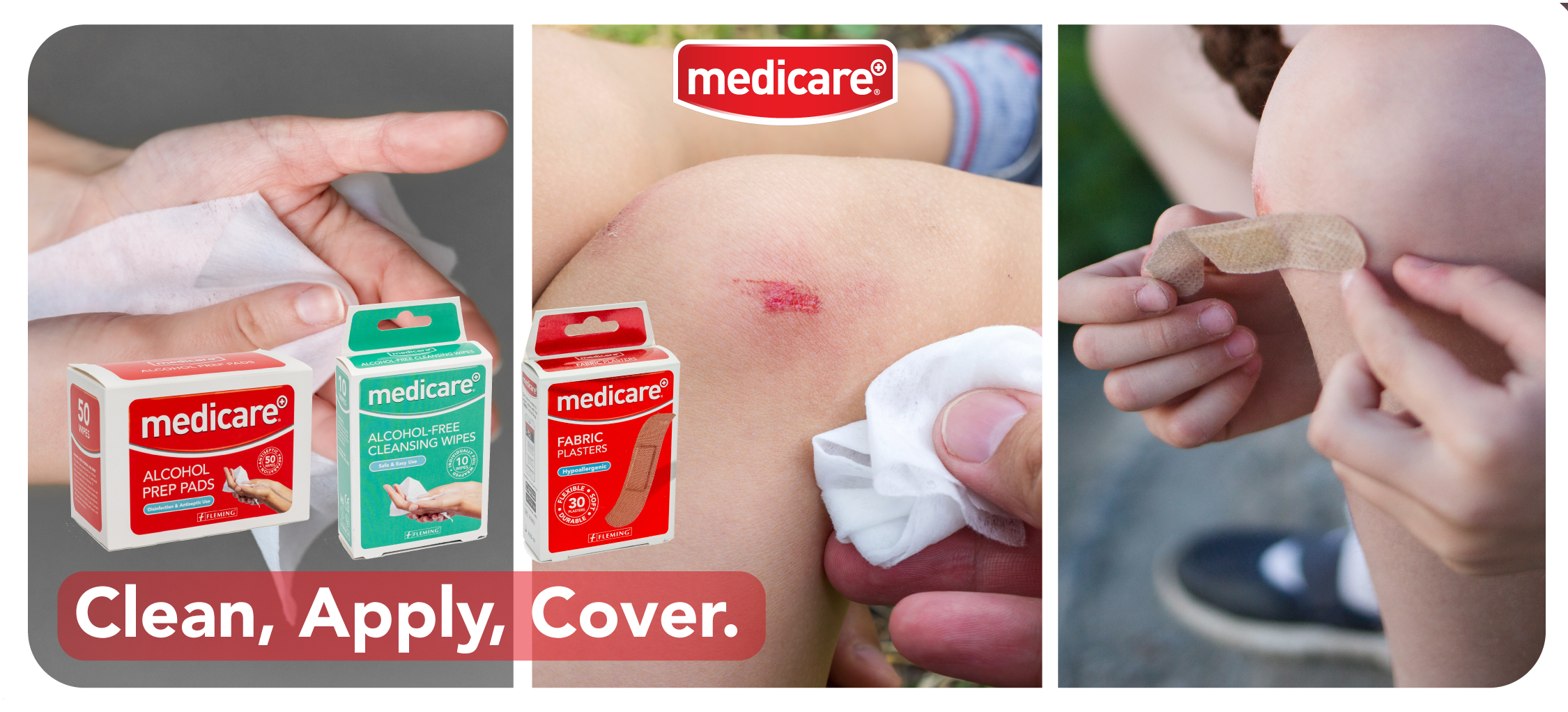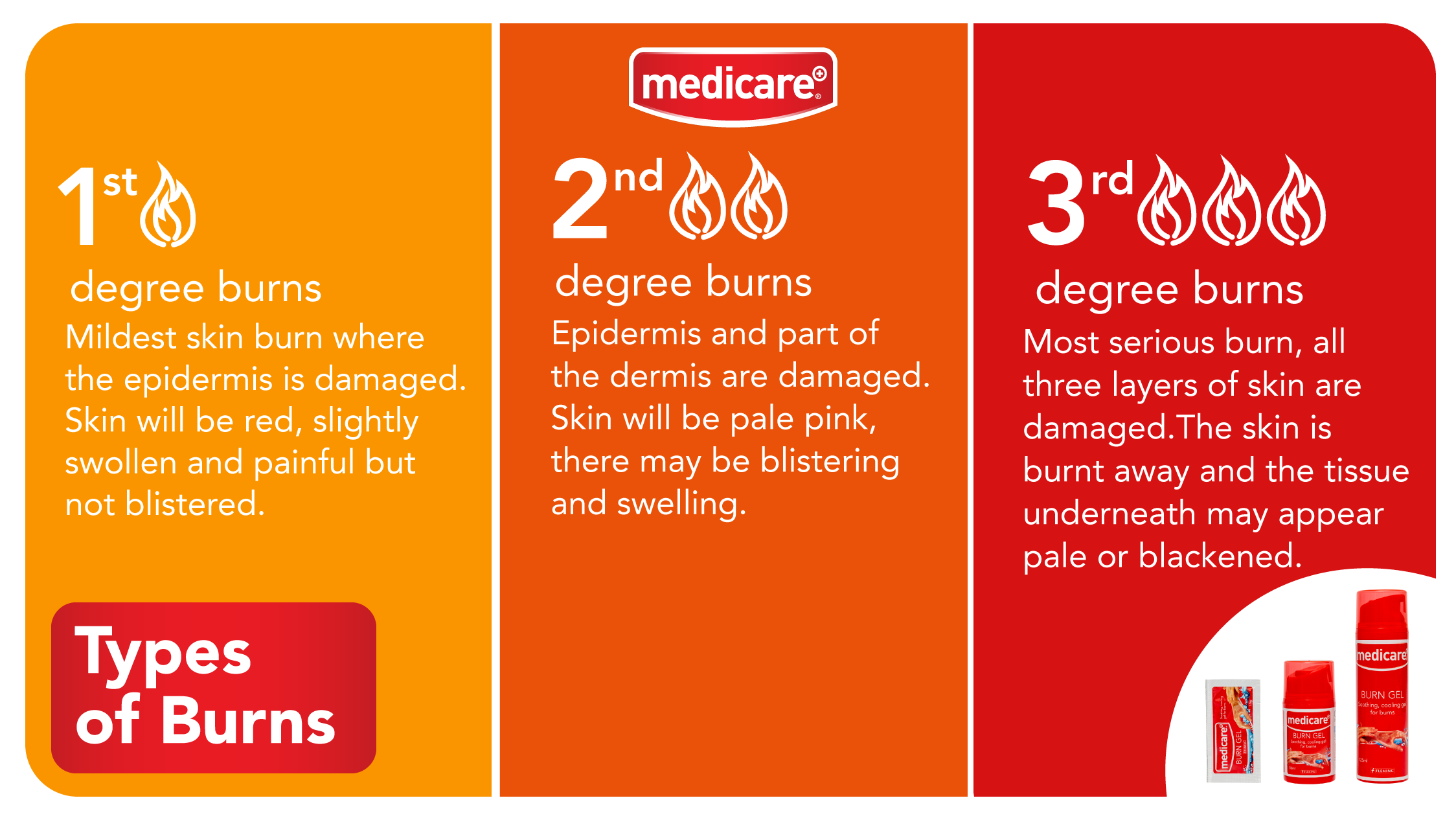Headlines
- Keeping Customers Covered: How Pharmacies can address the Summer Burn Surge - A clinical and practical guide for pharmacy teams
- Fleming Medical Achieves ISO 13485 Certification – Reinforcing Our Commitment to Patient Safety and Quality
- Gentle Daily Ear Care with Medicare Ear Spray
- Breathe Easy with Medicare Nasal Spray
- Fleming Medical Renews Support for Irish Heart Foundation’s “Before Damage is Done” Campaign with over €25K Donation
Be Rescue Ready this Christmas with our First Aid Guide
19 December 2021

It’s always when it is least expected when someone needs first aid treatment. It’s something we all want to avoid, especially at Christmas. Have a look at our festive first aid guide so that you can be Rescue Ready when an accident happens.
It’s always when it is least expected when someone needs first aid treatment. It’s something we all want to avoid, especially at Christmas. Have a look at our festive first aid guide so that you can be Rescue Ready when an accident happens.
Firstly, if the situation is serious, call an out-of-hours doctors’ service or an ambulance, but for more minor ailments, we have a handy guide to help you with the basics:
Cuts & Scrapes
For cuts and scrapes from Christmas-related injuries such as a bad paper cut from wrapping presents or a nick from chopping vegetables, use the Medicare Clean, Apply, Cover method when treating to reduce the chances of infection and to speed up the healing process.

Burns & Scalds
More often than not, we usually get burns at Christmas from cooking. Splattering hot oil from a pan, touching a hot dish without oven gloves, boiling water spilling over the pot, the list goes on. Don’t panic when you get a burn, follow the steps below:

What not to do with Burnt Skin:
Remember to use the R.I.C.E Method to aid a sprain or strain.
Eye Injuries
People with eye injuries should be sent to the hospital with an eye pad covering the affected eye.
Loose or Foreign Bodies in the Eye
If you are sick or have an accident over the Christmas period, always check in with the out-of-hours doctors’ services available in your area but call emergency services if the incident is serious or life-threatening. The HSE has a list of out-of-hours doctors’ contact information on its website .
Firstly, if the situation is serious, call an out-of-hours doctors’ service or an ambulance, but for more minor ailments, we have a handy guide to help you with the basics:
Cuts & Scrapes
For cuts and scrapes from Christmas-related injuries such as a bad paper cut from wrapping presents or a nick from chopping vegetables, use the Medicare Clean, Apply, Cover method when treating to reduce the chances of infection and to speed up the healing process.

- Clean: Infections in cuts and lacerations can often come from the hands. Before attending to a cut or laceration, make sure to clean your hands with an alcohol prep pad. Medicare Alcohol Prep Pads have a 99% alcohol content to clear germs away from your hands before you attend to a cut or laceration
- Apply: Gently cleaning the cut or scrape with water, Medicare Sterile Saline Solution spray or Medicare Alcohol-Free Cleansing Wipes before covering with a plaster or dressing can help remove any dirt and prevent infection, encourage healing and reduce scarring.
- Cover: Covering a cut with a sterile dressing or plaster after cleaning can ward off infection and promote healing. Medicare Fabric Plasters are hypoallergenic and allow the wound to ventilate, and their skin-friendly adhesive won't irritate the skin.
Burns & Scalds
More often than not, we usually get burns at Christmas from cooking. Splattering hot oil from a pan, touching a hot dish without oven gloves, boiling water spilling over the pot, the list goes on. Don’t panic when you get a burn, follow the steps below:
- Cool the burn with running room temperature water for 10-30 minutes, ideally within 20 minutes of the injury occurring.
- Remove rings or other tight items from the burned area. Try to do this quickly and gently, before the area swells.
- Apply Medicare Burn Gel to relieve pain and cool skin further. The pain from a burn can also be treated with an OTC pain reliever. (Speak to your pharmacist for recommendations).
- To protect against infection and minimise skin damage, apply a Medicare Sterile Burn Dressing. Gently lay the burn dressing across the burn site. Do not cover, it can be secured using a conforming bandage.

What not to do with Burnt Skin:
- Don’t break open small blisters as skin may become infected
- Don’t apply butter or oil
- Do not remove clothing that is stuck to the skin
- Avoid fluffy cotton that could shed and get stuck to the healing area
- Avoid putting too much pressure on the burnt skin
Remember to use the R.I.C.E Method to aid a sprain or strain.
- Rest: Avoid weight-bearing activity on the injured area in the first 24 to 48 hours of the injury occurring.
- Ice: Ice the injured area with a cold pack and compress for 15 minutes every 2-3 hours. This will reduce pain, swelling and bruising.
- Compression: Compress the injured area with strapping tape to help limit swelling and movement.
- Elevate: Elevate the injury, resting above heart level, and keep it supported. This will further help reduce any swelling.
Have a look at our handy hot/cold therapy infographic that explains what it is and when you need to use it.
Eye Injuries
People with eye injuries should be sent to the hospital with an eye pad covering the affected eye.
Loose or Foreign Bodies in the Eye
- Irrigate the eye with Medicare Sterile Saline Solution or Medicare Emergency Eye Wash. Do not attempt to remove anything that is embedded.
- If a foreign body can’t be removed, apply an eye pad and send the casualty to the hospital.
- Flush the eye with Medicare Sterile Saline Solution or Medicare Emergency Eye Wash for at least 10 to 15 minutes
- Apply an eye pad and send the casualty to the hospital.
- If there is a scalp wound, replace any skin flaps and using a clean pad, press down firmly and evenly over the wound. Once bleeding is controlled, secure the dressing in place with a bandage.
- Check the casualty’s level of response to simple questions, if consciousness is impaired, send for an ambulance immediately.
If you are sick or have an accident over the Christmas period, always check in with the out-of-hours doctors’ services available in your area but call emergency services if the incident is serious or life-threatening. The HSE has a list of out-of-hours doctors’ contact information on its website .
Have a safe and Happy Christmas from all of us at Medicare First Aid & Fleming Medical!
Explore our First Aid Section so you can stock up on all the essentials.
Explore our First Aid Section so you can stock up on all the essentials.

 Fleming Medical UK
Fleming Medical UK
